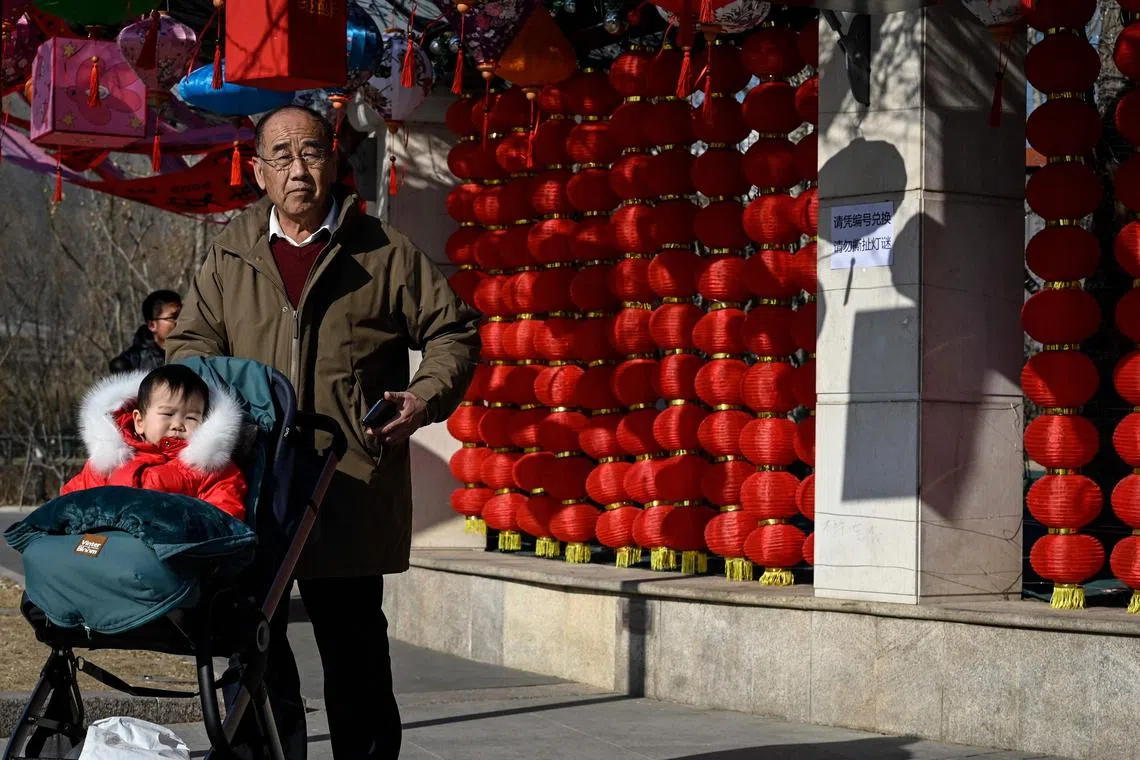How to make more babies to be hot topic at this year’s Chinese parliamentary session
Sign up now: Get insights on Asia's fast-moving developments

The country’s birth rate last year also hit an all-time low of 6.77 births for every 1,000 people, down from 7.52 in 2021.
PHOTO: AFP
BEIJING - Finding ways to boost China’s falling fertility rate is likely to dominate discussions as delegates of the country’s top political advisory body meet over the next week, with proposals ranging from free medical treatments for children aged under six, to allowing single women to freeze their eggs,
Delegates, who represent various parts of Chinese society including sectors such as science and technology and social welfare and security, and ethnic minorities in China, told the media they plan to propose shortening the number of years of primary education from six to five so that the Chinese can graduate earlier, and start families sooner. The third child of every family should also receive free education up to university, with some calling for college fees to be waived as well.
The popularity of suggestions to spur fertility comes as China’s population – currently the world’s largest with 1.4 billion people – declined by some 850,000 at the end of 2022.
The country’s birth rate last year also hit an all-time low
China’s full annual parliamentary meetings, comprising the Chinese People’s Political Consultative Conference (CPPCC) and the legislature assembly, the National People’s Congress, kick off this weekend.
The meetings, collectively called the “Two Sessions” or lianghui, will run mostly concurrently, with the last event scheduled on March 13.
During the meetings, delegates will analyse challenges that China faces, such as tepid economic growth, food security and a weakening job market, and propose policy solutions.
Delegates told The Straits Times after the opening ceremony on Saturday that besides trying to find ways to encourage more births, they want to focus on issues such as poverty alleviation and environmental conservation.
Ms Ou Yanling, a delegate from the Guangxi Autonomous Region in southern China, said that she wants to work on lowering transport fees, such as highway tolls, to make it easier for villagers to get out and sell their goods and produce.
“We have a lot of mountains in Guangxi, which is why it can be expensive to build roads to connect villages to metropolitan areas,” she said. “But the road fees and taxes can be a deterrent to villagers who may be trying to go beyond subsistence farming to selling their products.”
Dr Hua Yawei, a delegate from Henan province in central China who suggested in 2022 that single women should be allowed to give birth to one child, said that he also hopes to propose ideas on how to protect the environment better.
“There are fears of pollution if we are to go big on boosting the economy this year. I want to address those concerns,” said Dr Hua, referring to China’s stated priority of boosting its economy this year, after strict Covid-19 controls had battered growth in 2022.
Outgoing CPPCC chairman Wang Yang, in delivering his final work report on Saturday at the opening ceremony at the Great Hall of the People, said the top advisory body has been working on issues that are of national priority such as fostering innovation, ensuring food security and promoting overseas economic expansion, and battling pollution.
Mr Wang, previously fourth-ranked in the Politburo Standing Committee of the Communist Party of China – the apex of power – did not retain his seat at the party’s twice-a-decade congress last October, despite being one year shy of the unofficial retirement age of 68.
The new Standing Committee members are all President Xi Jinping’s allies.
Mr Wang, who goes into full retirement, is set to be replaced by Mr Wang Huning, now ranked fourth in the Politburo Standing Committee.



